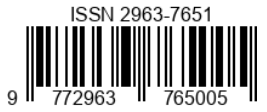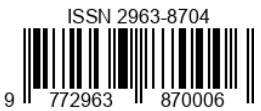Sistem Perkawinan Sesama Suku Menurut Hukum Adat Leworook di Desa Leraboleng Kecamatan Titehena Kabupaten Flores Timur
DOI:
https://doi.org/10.55606/jhpis.v3i4.4242Keywords:
Customary marriage is still maintained, marriage according to customary law, Marriage SystemAbstract
The purpose of this research is to the same-tribe marriage system according to leworook customary law in Leraboleng Village, Titehena Sub-district, East Flores Regency. This research is an empirical research, with field data as the main source of data such as interviews and observations. The results of the research that has been conducted, obtained that: (1) The Leworook community adheres to a three-stove marriage system with a patrilineal kinship system or kinship according to the father's line. the Leworook customary community's marriage system also adheres to exogamy marriage where a boy is obliged to marry a woman outside his tribe or clan. The marriage system between tribes means that the tribes in the Leworook indigenous community are grouped into three clans. (2) The marriage system according to Leworook customary law has an interconnected system between one tribe and another, stages of marriage that are highly respected in order to avoid inbreeding with other tribal groups and rules that need to be maintained and should not be violated.
Downloads
References
A. Hamid S dan Attamimi, 1994, pengembangan peraturan perundang-undangan Indonesia, PBHN, Jakarta
Andi Barani “ Tradisi Penne Anreang Dalam Perkawinan Adat Masyarakat Suppa Kabupaten Pinrang” Skripsi Institut Agama Islam Negeri Parepare 2020.
Antonius Tukan “Mengkaji Tradisi Muro bagi Perkawinan Adat Suku Lamaholot dan Hubungan dengan Kanon 1091 di Desa Ile Padung Paroki ST. Antonius Padua Lewolarang” Jurnal Stipas Kupang 2022Cornelis van Vollenhoven, 1983, Orientasi Dalam Hukum Adat Indonesia, Jambatan Kerjasama Inkultra Foundation Inc, Jakarta
Djaren Saragih, 1980, Hukum Perkawinan Adat dan Undang-Undang tentang Perkawinan serta Peraturan Pelaksanaannya, Penerbit Tarsito, Bandung.
Fau, Eligius Anselmus F. (2000). Persiapan Perkawinan Katolik. Flores, NTT: Nusa Indah
Hadikusuma, Hilman, Hukum perkawinan Indonesia menurut Undang-undang, Hukum Adat, Hukum Agama, Bandung, Mandar Maju, 2007
Hajati, Sri, dkk, 2018, Hukum Kekerabatan dan Perkawinan Adat, Jakarta, Kencana
Hilman Hadikusuma, 1995, Hukum Perkawinan Adat, Citra Aditya Bakti, Bandung
Hendra Nurtahjo, 2012, Legal Standing Kesatuan Masyarkat Hukum Adat, Salemba Humanika, Jakarta
Iman Sudayat, 1978, Asas-Asas Hukum Adat, Bekal Pengantar, Libert, Yogyakarta
Kusumadi Pudjosewojo, 1976, Pedoman Pelajaran Tata Hukum Indonesia, Aksara Baru, Jakarta
Moh. Koesno, Hukum adat Sebagai Suatu Model (Bagian I Historis), Mandar Maju, Bandung, 1992, hlm. 3-4
Pius K Makin, 2017, Leworook Pusaka Terpendam, Pusat Studi Kebudayaan Leworook, Kupang
Poli, Margaretha “ Sistem Perkawinan Adat Lamaholot Dalam Perspektif Antropologi di Desa Watodiri, Kec. Ile Ape, Lembata. Jurnal Universitas Udayana 2020.
R. Soerojo Wignjodipoero, 1983, Kedudukan Perkembangan Hukum Adat Setelah Kemerdekaan, Gunung agung, Jakarta
Soerjono Soekanto, 2020, Hukum Adat Indonesia, Hukum Keluarga, Rajawali Pers, Depok
Soerojo Wignjodipoero, 1995, Pengantar dan Asas-asas Hukum Adat, PT Toko Gunung Agung, Jakarta
Sunaryati Hartono, Dari Hukum antar Golongan ke Hukum antar adat, Citra aditya Bakti, Bandung, 1991
Undang-Undang Perkawinan di Indonesia, Undang-Undang No. 1 Tahun 1974, Surabaya:arkola.
Virgilia Welan “Perkawinan Adat Lamaholot Lika Tel’o di Desa Riangkemie Kecamatan Ile Mandiri Kabupaten Flores Timur” vol.4 Skripsi Universitas Nusa Cendana 2022.
Downloads
Published
How to Cite
Issue
Section
License
Copyright (c) 2024 JURNAL HUKUM, POLITIK DAN ILMU SOSIAL

This work is licensed under a Creative Commons Attribution-ShareAlike 4.0 International License.

















